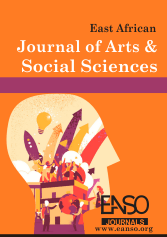How Single Motherhood Shapes Student Performance in Akheri Ward, Arusha
Abstract
This study examines the impact of single motherhood on the academic performance of children in Akheri Ward, Arusha, Tanzania. Grounded in the Family Deficit Model and Social Exchange Theory, it explores the emotional, economic, and social dimensions that shape educational outcomes in single-mother households. Using a mixed-methods design, data were collected from students, single mothers, and teachers through surveys, interviews, and field observations. Findings reveal that children raised by single mothers often face distinct challenges—including emotional vulnerability, financial hardship, and limited parental support—that hinder academic engagement and achievement. Yet, the study also uncovers powerful narratives of resilience: mothers actively support their children’s education through informal networks, while students demonstrate motivation and maturity in the face of adversity. These adaptive strategies reflect reciprocal relationships and community-based coping mechanisms. The study underscores the need for targeted interventions that address both structural barriers and emotional realities affecting student success. It contributes to the growing discourse on family structure and education in East Africa, offering practical insights for educators, policymakers, and community stakeholders committed to supporting vulnerable learners
Downloads
References
Amato, P. R. (2005). The impact of family formation change on the cognitive, social, and emotional well-being of the next generation. The Future of Children, 15(2), 75–96. https://doi.org/10.1353/foc.2005.0012
Children in Crossfire. (2024). Empowering single mothers through community-based education support. https://www.childrenincrossfire.org/programs/single-mothers-education
Coyne, L., & Beckman, J. (2019). Grief and learning: The academic impact of parental loss in adolescence. Journal of Educational Psychology and Development, 11(2), 78–92.
Cropanzano, R., & Mitchell, M. S. (2005). Social exchange theory: An interdisciplinary review. Journal of Management, 31(6), 874–900. https://doi.org/10.1177/0149206305279602
Creswell, J. W. (2014). Research design: Qualitative, quantitative, and mixed methods approaches (4th ed.). SAGE Publications.
Dizon, M. A. (2019). Emotional disruption and school performance among bereaved children. Asian Journal of Child Psychology, 6(1), 45–59.
FundsforNGOs. (2023). Supporting vulnerable families: Community resilience grants in East Africa. https://www.fundsforngos.org/resilience-grants-east-africa
Kilonzo, A., & Mwaisaka, J. (2022). Economic hardship and academic performance among children in single-parent households in Kenya. East African Journal of Education and Social Sciences, 3(1), 45–56.
Kilonzo, J. M., & Mwaisaka, J. M. (2022). Family structure and academic achievement among primary school pupils in Kenya. African Journal of Educational Research, 12(3), 89–104.
Malinda, J. (2017). Marital instability and single motherhood in Kinondoni District. Tanzania Journal of Family Studies, 4(2), 112–126.
Mkombe, C. F., & Msuya, J. (2021). Single motherhood and child wellbeing in Tanzania: A qualitative exploration. Tanzania Journal of Social Development, 8(1), 45–62.
Mkumbwa, A. (2023). Financial barriers to education in single-mother households: A study of secondary schools in Tanzania. East African Journal of Social Policy, 7(1), 33–49.
Mgomera, R. (2021). Teenage pregnancy and educational exclusion in Magu District. Journal of Gender and Education in Africa, 5(3), 88–102.
Mushi, P., & Lema, E. (2021). Coping strategies among single mothers in Tanzania: A community-based perspective. Journal of African Family Studies, 9(2), 88–104.
National Bureau of Statistics. (2022). 2022 Population and Housing Census: Akheri Ward Profile. Government of Tanzania.
Ngowi, H. (2023). Emotional well-being and academic engagement among Tanzanian youth in single-parent homes. Tanzania Journal of Psychology and Education, 5(1), 22–34.
Ngowi, R. A. (2023). The psychological impact of parental absence on Tanzanian students: A case study of Arusha Region. Journal of Child and Adolescent Studies, 9(1), 33–47.
Ntoimo, L. F. C., & Mutanda, D. (2020). Single motherhood in sub-Saharan Africa: Patterns and predictors. African Population Studies, 34(1), 1–15. https://doi.org/10.11564/34-1-1572
Shitindi, E., & Lubawa, M. (2022). Socioeconomic challenges of single mothers in Tanzania: A comparative study of Dodoma and Dar es Salaam. Tanzania Journal of Social Work and Development, 10(2), 56–70.
UNFPA Tanzania. (2020). Adolescent pregnancy and its impact on education. https://tanzania.unfpa.org/en/publications/adolescent-pregnancy-and-education
UNICEF Tanzania. (2021). Education and child protection in Tanzania: Annual report 2021. UNICEF Tanzania. https://www.unicef.org/tanzania/reports/education-and-child-protection-2021
United Republic of Tanzania (URT). (2020). Education sector development plan (ESDP) 2016–2021. Ministry of Education, Science and Technology. https://www.moe.go.tz/publications
Vallejo, R. (2025). The long-term academic effects of parental death in childhood. Global Journal of Educational Research, 13(1), 21–39.
Yamane, T. (1967). Statistics: An introductory analysis (2nd ed.). Harper & Row.
Copyright (c) 2025 Rehema Ally Shekuwe

This work is licensed under a Creative Commons Attribution 4.0 International License.




























